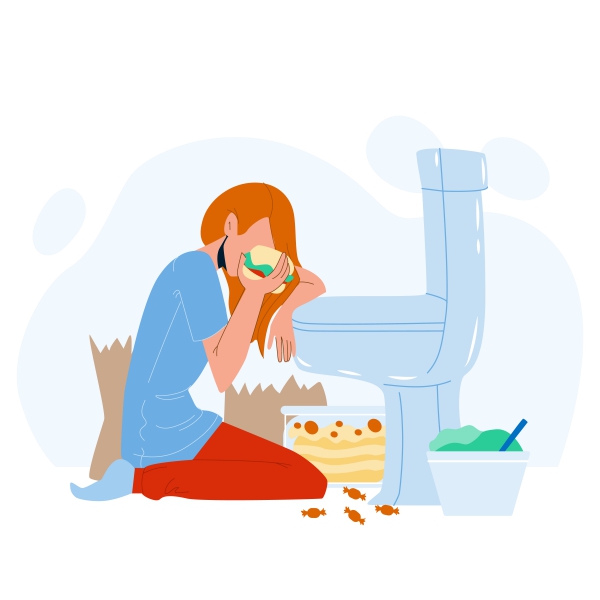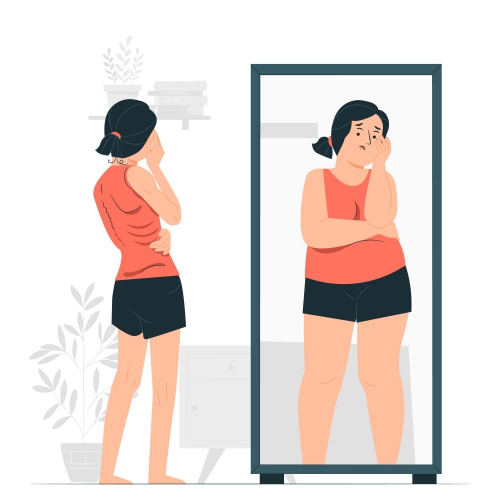Bulimia Nervosa, Binge eating, Purging, Eating disorder
Description : Bulimia nervosa, most commonly known as bulimia, is an eating disorder involving episodes of binge
Article Details :
What is bulimia nervosa?
Bulimia nervosa, most commonly known as bulimia, is an eating disorder involving episodes of binge eating (eating an excessively large amount of food) followed by episodes of purging. (vomiting ingested food in an attempt of reducing the amount of calories consumed). It is a common condition that can be potentially serious and life-threatening.
To achieve purging, people with bulimia nervosa may self-induce the vomiting or misuse medications such as laxatives, diuretics or weight loss supplements. Another way in which people with bulimia can reduce excess calories is to start strict diets or fasting as well as exercising excessively.
Bulimia is a condition that is more common among women compared to men. Another aspect of this condition is that those with it have a tendency to constantly be anxious about their weight and body features. They tend judge themselves severely and have a problem with their body image.
There are different aspects of bulimia that has to be tackled during the management of the condition. With early and appropriate management of bulimia, the course of the condition will be favourable, avoiding potentially serious complications.
Causes and risk factors of bulimia nervosa
The exact cause of bulimia is not known up to now. It may be due to a series of factors including your genes, emotional wellbeing and the influence of society. There are some factors that can put you more at risk of having bulimia, including:
- Growing up overweight
- Having a close family member with an eating disorder
- Having emotional problems
- Having coexisting psychiatric disorders such as anxiety, depression or substance abuse
- Going through traumatic events
- Following diets
What are the symptoms of bulimia nervosa?
Bulimia nervosa can present with many symptoms, which commonly comprises of:
- Periods of food bingeing and eating uncontrollably
- Periods of purging where those with the disease induce the vomiting
- Misuse of medications such as laxatives, diuretics and fasting in order to compensate for the amount of calories consumed
- Excessive concern about own body image and features
You are said to have bulimia if the above occur at least once per week for a duration of 3 months.
Bulimia may present with other symptoms if associated with other comorbidities such as anxiety disorder, body dysmorphic disorder, depressive disorders, post-traumatic stress disorder and substance abuse disorder.

Making a diagnosis
To make the diagnosis of bulimia, your doctor will begin with a psychiatric and clinical history. It is important for you to give all important information to your doctor and not be ashamed of your condition. Your doctor is here to help you. He/she will start by asking you general questions and then ask you more specific questions targeted to eating disorders. Your doctor will then proceed with a physical examination including measurement of your weight, height, heart rate, blood pressure and temperature. He/she will also examine your skin, mouth, throat and abdomen.
If you have bulimia, it is common to have an accelerated heart rate, low blood pressure, dry skin, swelling of your salivary glands and damage to your teeth.
If your history and physical examination point towards the diagnosis of bulimia, some further tests may be required including:
- Serum electrolytes
- Blood urea nitrogen
- Serum creatinine
- Full blood count
- Liver function tests
- Urinalysis
- Pregnancy test in females
How is bulimia nervosa treated?
Once the diagnosis of bulimia is made, it is important to start the management as soon as possible to prevent the occurrence of complications. There are different treatment options that exist and may sometime be used in combination with each other for better results. These include:
- Psychotherapy: This is usually done with the help of a medical health professional. It involves sessions where you and your therapist discuss about the condition and the issues that are associated with it. There are different forms of psychotherapy, for example, cognitive Behavioral therapy, family-based treatment and interpersonal psychotherapy. Each one of them address particular aspects of the disease and your life. Your mental health professional will know best which form of psychotherapy suits you the most based on your specific case.
- Antidepressants: In some cases, antidepressants may be prescribed in combination with psychotherapy for better results. Only fluoxetine is known to be effective in the management of bulimia.
- Nutritional education: A dietician may help you in designing a tailor-made eating plan in order to help you in adopting healthy eating habits and avoiding cravings.
- In patient care: If you have bulimia and a distorted body image, you may start having suicidal ideations. In this case, your doctor may have to admit you to make sure that you will not harm yourself.
What are the complications of Bulimia nervosa?
Bulimia is a serious condition which can Read more




